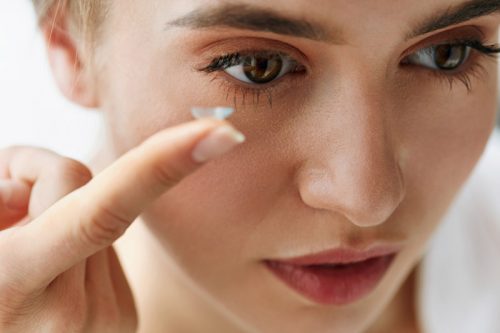
Do you wear contact lenses? If so, how well to you clean them? Do you wear them exactly as your doctor as directed? Have you ever “taken shortcuts” or “bent the rules” in terms of how you’ve handled or cared for your contacts?
If you’ve fallen short in these areas, you’re not alone. In a 2011 study, researchers at the University of Texas Southwestern Medical Center found that only 2 percent of people who wear contact lenses adhere to the appropriate cleaning procedures. The vast majority of people who do not follow good contact lens hygiene don’t even realize it. The University of Texas study reported that fully 80 percent of contact lens wearers think they’re following the proper procedures, when in fact they aren’t.
This is not to say it’s “okay” to do-your-own-thing when it comes to your contact lenses. Unsafe use of contacts or improper contact lens hygiene can cause serious eye infections like conjunctivitis (pink eye) and keratitis (inflammation of the cornea), as well as cuts or sores in the cornea (the clear dome of tissue over the iris—the colored part of the eye), scarring and even blindness.
Of course, it’s not just prescription contact lenses that can cause problems if misused. Costume contact lenses (also known as decorative or cosmetic lenses), which are worn to change eye color, have become very popular in recent years. The trouble is, consumers often buy these kind of contact lenses from websites and retailers without a prescription or receiving instructions on how to clean and care for them, and without a proper fitting. If the lens is the wrong size for your eye, it can scratch your cornea or prevent your cornea from getting the moisture it needs from your tears. This can lead to infections, corneal ulcers and vision changes.
Still, contact lenses can certainly provide a safe and effective form of vision correction. Costume contacts, too, have their place, especially when it comes to dressing for events like plays and costume and Halloween parties. But contacts of any type must be used and cared for properly. To protect your eyes, we recommend the following contact lens safety tips:
Always properly wash your hands before inserting or removing your contact lenses.
Before you put on your contacts, take them off or handle them in any way, make sure your hands are clean and dry. When washing your hands, avoid soap that is very oily or contains cream, lotion or perfume; these types of soaps could leave a residue on your hands, which could be transferred onto the surface of your contacts. To dry your hands, use a clean, lint-free towel to prevent residue on your contacts.
 Never allow your contact lenses to come in direct contact with water.
Never allow your contact lenses to come in direct contact with water.
The only liquids your contacts should ever be exposed to are the saline, disinfecting and multipurpose solutions specially designed for use with contact lenses. Don’t try to “make do” with tap water or even filtered, bottled or distilled water for use with your contacts. Avoid swimming (in a lake, ocean or pool) or showering while wearing your contacts. Water may contain parasites, bacteria and other microorganisms which can be absorbed by your contacts and cause eye infections.
Only use contact lenses for the length of time recommended.
Don’t wear your contacts for a longer period of time than they’re designed for. For instance, if you’ve got extended wear lenses, they may be fine for up to two weeks of continuous wear, but don’t try to stretch them out to three or four weeks. If you have daily wear lenses, don’t keep them on for two days straight. Stick to the time period recommended for your particular type of lenses. Any longer than that can irritate your eyes and even lead to infections or corneal ulcers.
Don’t reuse or “top off” old contact lens solution.
Always discard old contact lens solution and replace it with fresh solution each day. Don’t “top off” the solution, meaning you just add new solution to the old solution that’s already in the case. Doing so can promote harmful bacteria growth.
Don’t ever share contacts.
Never let anyone else wear your contacts, and don’t use anyone else’s. If you do, any germs that person has could be passed on to you via the shared contact lenses, which puts you at risk for the same infection. Furthermore, if you wear another person’s contacts, his or her contacts may not be the right size or fit for your eyes, which could scratch or harm your cornea.
Never sleep in your contacts.
Unless your contact lenses are approved for continuous overnight use, always remove your contacts before going to bed. Sleeping with contacts on can put you at risk for corneal infection, extreme pain, light sensitivity, and even vision loss.
Don’t start your kids on contacts before they’re ready.
Contacts can provide many benefits to children and teens, including boosting their confidence, self esteem and social skills. However, kids must be mature enough to wear and use their contacts safely. If a child is too young to practice responsible contact lens hygiene, serious problems can arise. A 2010 study published in Pediatrics reported that about 13,500 (one-fourth) of the more than 70,000 children who go to emergency rooms each year go for injuries and complications from medical devices are related to contact lenses.
So what is the best age for kids to start wearing contacts? Ohio State University’s Contact Lens In Pediatrics (CLIP) study concluded that children as young as age 8 can be fitted for contact lenses. Another study, conducted by the American Optometric Association, reported that most optometrists and ophthalmologists recommend kids be at least 10 to 12 years of age before introducing them to contacts. These are only guidelines. Exactly when kids can be started on contacts depends on the maturity level of the individual child. If parents have any doubts, it’s always best to wait until they are certain their children are responsible enough to properly use contact lenses.
 Do not wear costume contact lenses that are not prescribed by an eye doctor.
Do not wear costume contact lenses that are not prescribed by an eye doctor.
Costume contacts can be a wonderful accessory to your Halloween costume, but they should be purchased by a trusted source. Generally that means going to your eye doctor and getting a prescription. Don’t buy cosmetic lenses from online retailers, costume shops, street vendors, salons or beauty supply centers, flea markets, novelty stores, convenience stores or other sellers that do not require a prescription.
It is important for you to discuss your desire to wear these accessories with your doctor; he or she can determine whether or not your eyes are healthy enough to withstand wearing contact lenses and will either have an in-house source you can order them from or let you know where you can purchase them safely. If you don’t normally wear contact lenses to correct your vision, your eye doctor will also be able to tell you what size is appropriate for your eye and how to properly clean the lenses.
Whether you are wearing lens to improve your vision or for cosmetic purposes, only use contact lenses approved by a licensed eye care practitioner. Your eye doctor will give you a complete set of instructions for using and caring for your contacts. Always follow these directions, even if you are tired or rushed. Taking shortcuts with your contacts is never a good idea. If you do experience any prolonged discomfort, redness, or change in vision from your contacts, contact your eye doctor immediately.
